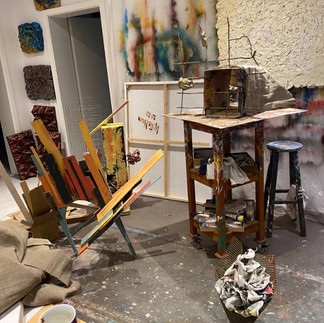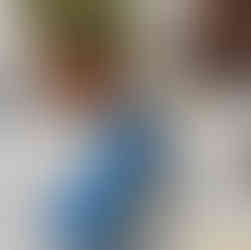Philosopher Rene Descartes in 1637 introduced the concept of "I think, therefore I am". Although this judgment has already been repeatedly criticized, since the very concept of “I” implies the existence of “a thinking me”, and nevertheless, this statement is close to me and I want to start with it.

Untitled, 2022, recycled wood, cardboard; paint, screws, glue, 109 x 45 x 110 cm.
Process of working: I can't remember how it all happened. There were materials in the studio, I remember I didn’t work for a long time, so I really wanted to create, and the colours were in my hands. There were no plans or ideas, just fragments of wood, paints and other materials. There were cuts from previous works. The wood is so nice and natural. One form finds another - it turns out in an exciting game of relationships. I add a little colour and interpretations and associations appear.
From the outside, it may seem that doing such work is the strangest and most inappropriate thing that a person can do. Because there is no purpose of the work, also no one needs the finished result. It cannot be eaten, or it will not warm in the winter, and it will not even bring money either.

Such unconscious work happened naturally. Nothing hinders the creative process, nothing delays the energy of movement. The work is motivated by my inner aspiration and desire. My trigger to create is so natural that I can't imagine doing anything else. I forget to eat and it annoys me that I have to sleep when the day is over and not to create. Isn't this the voluntary action in which a person truly exists or not?

I strove not to think or plan, but simply to function unconsciously. Yes, my physical body was there, but at least there was no logic in my actions. I was not thinking, but “I was”. I don't think about how to breathe, or how my heart beats, I don't plan my dreams. I also can't control my eye twitching for the past month. In the same way, I am not aware of what I am doing in the process of work, but I am working. And as a rule, in this state, the most exciting artworks are obtained. In this state, I "found" my technique with paper.
The biggest researcher of the unconscious is Sigmund Freud, who has influenced a number of artists.

The Birth of the World, Joan Miró, (Spanish, 1893–1983) 1925. Oil on canvas, 8' 2 3/4" x 6' 6 3/4" (250.8 x 200 cm) [online] At: https://www.moma.org/learn/moma_learning/joan-miro-the-birth-of-the-world/ (Accessed 03.11.2022)
“Rather than setting out to paint something I began painting and as I paint the picture begins to assert itself, or suggest itself under my brush.… The first stage is free, unconscious. But, he continued, “The second stage is carefully calculated.” MoMALearning Surrealism. Tapping the Subconscious: Automatism and Dreams [online] At: https://www.moma.org/learn/moma_learning/joan-miro-the-birth-of-the-world/ (Accessed 03.11.2022)
But research does not stand still, and over the past hundred years, scientists have proven more detailed facts. For example, Pawel Lewicki proved that preferences can even develop in the unconscious, which makes learning easier.
Moreover, an American neuroendocrinology researcher and professor of biology Robert Sapolsky, who argues that we do not have Free will. According to the scientist, any of our actions are motivated by the sensory environment, hormone levels, stress, happiness, neuroplasticity, culture, and how we were parented. Dr. Robert Sapolsky: Science of Stress, Testosterone & Free Will | Huberman Lab Podcast #35 [online] At: https://youtube.com/watch?v=DtmwtjOoSYU&feature=share&utm_source=EKLEiJECCKjOmKnC5IiRIQ (Accessed 03.11.2022)
This means that the fact that I unconsciously started making wood crafts when I was a teenager, although no one taught me, is due to the conditions, culture, hormones and the environment in which I grew up.
The fact is widely discussed that if Mozart had not been born in the family of a music theorist and cellist, would he give concerts at the age of 5 and achieved what he achieved?

So in my childhood, my father was fond of oil painting, and in a country house he always worked with his hands, we had a well-equipped workshop and a large amount of wood around. I was surrounded by a craft atmosphere. Thus I cannot speak of my free choice of creative direction, but of the natural confluence of circumstances and facts. Continuing this logic, if everything is subject to physics, psychology and other reasonable disciplines, what is my art subject to? And is the creation of art a completely justified act from the point of view of neurology, psychology and physics?
It is impossible to say precisely what it means to live but it is clear that it happens in time. We are born, we do something and we die. This gap between the two points of beginning and end is the form of life. In this gap, we strive to get food, be safe and multiply. We make very logical and motivated actions aimed at satisfying these primary human needs. We are working on it and while doing we are living. I would say - "I work, therefore I am".
We create different objects to help us achieve these goals. For example, the simplest:
Ambush, for hunting, food…
Signs, for safety…
Objects for directing water in the right direction, for convenience...
Building a house, a hunting shelter, a drain, a sign is a conscious activity dictated by the need for your hormones, mood, rules, and society.
If everything is dictated by the exact sciences, then the creation of artwork should be logical and conventional. Then how did Duchamp's urinal originate? Or the works of Pollock? Was it a malfunction in hormones, the shock of the war, or did they just both live near a hardware store with toilets and household paints? What provoked such a non-standard change in the works of these masters?
Perhaps the lack of logic, consciousness and reason can help us come closer to understanding "living". So to say real "thinking" and real “living” is unconscious. If this gap between the beginning and the end of our life is so predictable by our hormones and the overall context, then maybe there is a desire to go beyond a "hormone-driven life" and research something new?
Why? Because I have not felt anywhere as good as in these moments. This is absolute happiness. This is exactly what distinguishes pure "living" for me - be happy and do what I want. My "hormones" tell me that this is something simple that I want to cultivate in life and be in it. When all needs, plans, and ideas are turned off - my hormones, culture, the situation in the world, and my education start to work. This is a pure communication of my inner state and the atmosphere around me. The materials in my studio and then in my works are proof of this. This is part of my hormones and motivations, moods - I work as an artist. So in my workshop what is in my workshop - naturally predictable "hormones" fact. This is not an accident or a coincidence.
For me, the quality of the material is abstract. Also, space is not endowed with preconceived meanings. Therefore, figuratively, water as a medium can be on the ceiling as a place of existence. Such free use of the qualities of common materials disturbs the nature of our perception and gives a crack in prejudices about familiar things.
The placement of such an incomprehensible object in nature or in the habitual human habitat is the first thing that attracts attention.
It's not clear why this is here. The brain tries to make associations with what it knows. The unfamiliar triggers new experiences in the viewer's head and creates new neural connections. Searching for the familiar through the unfamiliar and not finding it creates a precedent. And once what happened can appear again and be used somewhere else. Similar to the precedent in law in some countries, where once a non-standard and new judge's decision can be used later in legal proceedings. Perhaps such unusual, new will emerge in the mind of a person just at the moment when he is looking for solutions. No, this is not a catharsis. This does not mean that through experience and tragedy a person will cleanse his soul and become better in his decisions. Here's something else. More like critical thinking. The more a person looks at what he does not understand, the more incomprehensible becomes familiar. And what is familiar and seen already does not seem so distant and hostile. Therefore, one day a person can ask the question, why exactly is it so? And such a question will be the beginning of critical thinking.
Bibliography and references
1. Bateson, G. (1987) Steps To An Ecology Of Mind. Collected essays in anthropology, psychiatry, evolution, and epistemology. Jason Aronson Inc.
2. Dr. Robert Sapolsky: Science of Stress, Testosterone & Free Will | Huberman Lab Podcast #35 [online] At: https://youtube.com/watch?v=DtmwtjOoSYU&feature=share&utm_source=EKLEiJECCKjOmKnC5IiRIQ (Accessed 03.11.2022)






















コメント